GAF
With Historic Rebuke, EPA Sends GAF Permit Back to Austin…and a Message to Company
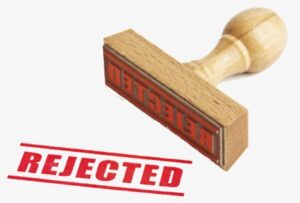
When Janie Cisneros and her Singleton United contingent met with EPA Region Six Director Dr. Earthea Nance and her staff on June 1st, one of the residents’ goals was to convince EPA to send West Dallas asphalt shingle maker GAF’s Title V operating permit back to the Texas Commission on Environmental Quality for a rewrite.
Mission accomplished.
In a stunning rebuke that often echoed the sentiments and language used by West Dallas residents campaigning for GAF’s closure, EPA sent notice to the company, state, and residents on late Friday afternoon that not only was the permit deficient, so was the state process that approved it.
The EPA letter is posted on Downwinders’ FaceBook page here.
EPA often gives authority to state agencies to tentatively approve or deny all renewing federal permits in their jurisdiction but retains the right to send the permit back to the agency for reconsideration if it finds the finished product isn’t fulfilling federal regulatory requirements. Even though TCEQ had approved the GAF permit in Austin, it still needed EPA’s approval in Dallas. It didn’t get it.
And the permit didn’t just get sent back. It got sent back with a big ol’ boot print on it. In both tone and scope, EPA’s response is unprecedented.
In its letter EPA identified five major objections, all of them coming down to a different version of the same demand: “TCEQ must ensure that the Title V permit includes monitoring, recordkeeping, and reporting sufficient to assure compliance with the hourly and annual emission limits” GAF has listed in its permit.

Janie Cisneros (l) meets with EPA Regional Administrator Dr. Nance (r) and Staff on June 1st of this year
EPA staffers expose the disconnect between GAF’s estimated permitted emissions and the non-existent, obsolete, or ineffective ways those emissions are accounted for in the permit. This includes the lack of any stack testing on major pollution control equipment in over 14 years at the GAF factory – a major point of contention with residents at their June 1st meeting with EPA.
“It is unclear and the record does not justify how a stack test last conducted 14 years ago during GAF’s normal operations is still representative of current operations….” concludes EPA, and then adds,
“It is unclear to EPA why GAF is not required to conduct periodic stack testing of its thermal oxidizer at a minimum frequency of at least once per permit term (ex. every five years) for VOC, SO2, CO, NOx, PM10, PM2.5 (filterable and condensable), and any relevant Hazardous Air Pollutants. TCEQ must explain how it has determined that the emission characteristics of the Thermal Oxidizer/Waste Heat Boiler have not changed since the latest stack test and are not expected to change over the term of the Proposed Permit. Conversely, if TCEQ believes that the emissions characteristics are reasonably likely to change over time, TCEQ must amend the permit to require periodic stack testing with a specified frequency. Further, TCEQ must amend the Proposed Permit to require the use of the emission factors from the most recent stack test and ensure the calculations used to determine compliance are made part of the permit. “
Because the Proposed Permit does not identify with enough specificity a particular monitoring or recordkeeping requirement associated with the related units, neither the public nor the EPA can ascertain from the permit what monitoring or recordkeeping methodology the source has elected to use, or whether this methodology is sufficient to assure compliance with all applicable requirements. This effectively prevents both the public and the EPA from determining if the chosen monitoring, recordkeeping, and reporting satisfies Clean Air Act requirements.”
Considering how far off the mark the company has historically been in estimating its own pollution to both TCEQ and EPA, this is not an unreasonable requirement. It’s the taking to task of TCEQ’s lack of rigor that’s eye-opening and new.
The majority of EPA’s letter is spent on this kind of combination of surgical/technical explanation of why a permit provision is inadequate, and their slacked-jaw astonishment that TCEQ could approve such a thing.

Team Singleton United at Region 6 EPA HQ on June 1st
But wait, there’s more.
There’s a seven-and-a-half page supplement to the specific Title V comments entitled “Additional Comments Outside of EPA’s Objections.”
As part of this section, EPA does a deep dive into the history of GAF’s nuisance complaints submitted by residents over the last 20 years and concludes “…based on the consistent frequency and nature of odor complaints, nuisance events still appear to be adversely and disparately impacting West Dallas residents’ quality of life and interfering with the normal use and enjoyment of property.” In writing the sentence this way EPA is quoting from the TCEQ’s own definitions of “air pollution” and “nuisance.” With it, EPA has given the City of Dallas just about all the evidence it needs to proceed with amortization.
Clearly exasperated, EPA asks, “Can TCEQ explain what measures, including any associated monitoring, that GAF has implemented that ensures ongoing compliance with the nuisance provisions outlined in 30 TAC § 101.4 or any other information that may provide the EPA and the public certainty that odors leaving the plant are not in violation of nuisance provisions? Has TCEQ been on-site during the heating and unloading of railcars while the “top hatch on the railcar is cracked open” and confirmed whether such unloading operations are a source of emissions/odors at the site? Lastly, complainants and investigators have identified both odors and “smoke” at the site. Has GAF and/or TCEQ considered voluntarily adding new pollution controls and work practice standards to reduce off-site odors as well as SO2 and PM2.5 emissions to minimize potential impacts on the community?”
EPA concludes its letter with advice to TCEQ on how the agency should align its permitting process with modern Environmental Justice metrics and principles. It even gives the state two recommendations: “1) TCEQ should engage early in the permitting process with communities and applicants to address environmental justice, and 2) TCEQ should avail itself of EPA’s most recent EJ resources and tools, such as use of the most up-to-date EJScreen tool and EJ related trainings available.”
It’s clear from the examples and even direct quotes used in the letter that someone at EPA has actually reviewed the blow-by-blow summary of GAF’s 45-year regulatory track record on the Singleton United website as well as its “Case for City Amortization of GAF” – and finds them compelling.

“So Long GAF” postcards on the company’s fenceline May 17th
That’s got to be concerning to GAF management as they continue to try and negotiate their way out of a forced exit by the City. Because as surely as EPA was lecturing the State of Texas in its letter, it was also sending a message to GAF HQ in New Jersey. The message is something like….
“It’s mid-2022 and your Title V permit isn’t even close to being finalized. We’ve challenged TCEQ to make you prove so many things you haven’t wanted to prove in so long that it might take years to work out the kinks – that is, if you really want to. We’re sure we don’t have to remind you that your big, fat, overarching “New Source Review” permit that covers literally everything you’re doing in West Dallas is coming up for renewal in November 2024. That will make this look like a Methodist picnic. Do yourself a favor: work a deal and leave now, while you’re still in control of your own clean-up at a 76-year old factory site.”
We’re paraphrasing of course.
But Texans have never seen an EPA talk to polluters or their facilitators at TCEQ they way it does in this GAF Title V letter. It’s a big and welcomed change. And it was initiated by that group of determined Singleton United/Unidos residents back on June 1st. Congratulations.
One of Dallas’ Biggest Polluters Appears to Be Breaking the Law in West Dallas
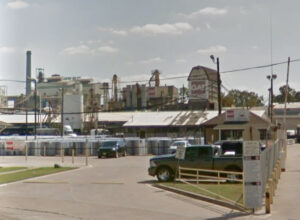 FOR IMMEDIATE RELEASE : 8 am Wednesday July 21
FOR IMMEDIATE RELEASE : 8 am Wednesday July 21
Contact: Raul Reyes Jr.: President, West Dallas 1 – 469-880-3811
Evelyn Mayo, Neighborhood Self-Defense Project – 774-810-0849
“GAF is the new RSR.”
Alliance Says West Dallas Polluter is Operating Illegally and Poisoning Residents…Just Like Infamous Lead Smelter. And They Want it Gone.
Giant shingle factory doesn’t have needed permits from City; Monitors show its likely violating federal air pollution standards too
(Dallas)– In a stunning replay of West Dallas environmental justice history, a new alliance of
groups says the largest polluter in West Dallas lacks required City of Dallas documents to operate, and could be in potential violation of federal air pollution standards. It’s the same circumstances that forced the former RSR lead smelter, once also located on Singleton Boulevard, to close in the 1980’s.
“GAF is the new RSR” said Raul Reyes, President of neighborhood group West Dallas 1, and spokesperson for the new coalition of allies, “This factory is operating illegally, lacks basic pollution controls, and is too dirty to be doing business in West Dallas neighborhoods. And just like RSR, it should be closed.”
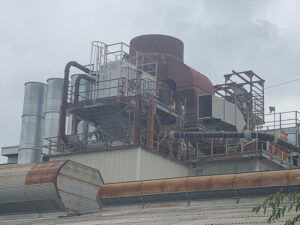 GAF has operated its West Dallas asphalt shingle factory for so long a lot of its pollution is “grandfathered” – unfiltered by any modern controls like “scrubbers” despite that technology being capable of removing up to 99% of sulphur dioxide emissions. In the last EPA inventory available from 2019, it was listed as Dallas County’s third largest air polluter with over 260 tons being spewed from GAF into surrounding neighborhoods that year alone. That includes 125 tons of Sulfur Dioxide pollution – more than any other facility in Dallas.
GAF has operated its West Dallas asphalt shingle factory for so long a lot of its pollution is “grandfathered” – unfiltered by any modern controls like “scrubbers” despite that technology being capable of removing up to 99% of sulphur dioxide emissions. In the last EPA inventory available from 2019, it was listed as Dallas County’s third largest air polluter with over 260 tons being spewed from GAF into surrounding neighborhoods that year alone. That includes 125 tons of Sulfur Dioxide pollution – more than any other facility in Dallas.
For years, surrounding residents and workers have reported sulfur-like rotten egg odors in the Singleton corridor around GAF, leaving them with headaches and nausea. But it’s the tiny pieces of soot being emitted from the facility that could get the company in trouble with the EPA. Using off-the-shelf Purple Air monitors for Particulate Matter, West Dallas residents independently monitored PM pollution around the GAF plant over the past two years. Results show levels of air pollution that likely violate both the 24-hour and annual national standards for PM 2.5 microns or smaller. If official EPA monitoring confirms the violations, the part of West Dallas around GAF, which hosts many other industrial polluters that are likely contributing to this pollution, could be declared a “non-attainment area” for PM pollution. GAF and other West Dallas PM polluters would have to submit a plan to decrease their emissions and new industries would be subject to stricter limits. RSR was also violating air pollution standards when the City of Dallas began to seek its closure in the late 1970’s.
Just like lead scientists believe there’s no “safe level” of exposure to PM pollution. A violation of its national ambient air standard is a dangerous condition that can leave lasting health harm among the hundreds of residents who live next to GAF, especially children.
Reviewing the results from the GAF monitoring, Dr. Natalie Johnson, a faculty member of Texas A&M’s School of 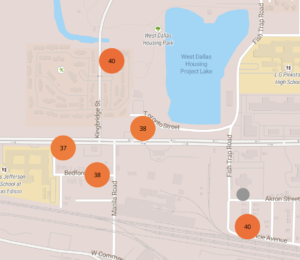 Public Health specializing in respiratory toxicology and environmental health warned, “If verified by EPA, these numbers are concerning. Exposure to levels over the EPA regulatory limits can lead to chronic diseases, such as heart disease, stroke, and premature death. The immune system, reproductive system, and developmental functions can also be harmed. The elderly, children, and infants are particularly vulnerable.”
Public Health specializing in respiratory toxicology and environmental health warned, “If verified by EPA, these numbers are concerning. Exposure to levels over the EPA regulatory limits can lead to chronic diseases, such as heart disease, stroke, and premature death. The immune system, reproductive system, and developmental functions can also be harmed. The elderly, children, and infants are particularly vulnerable.”
Janie Cisneros, who lives with her family just feet from GAF’s fence line and hosted one of the monitors said “I grew up on Bedford Street and GAF was always a big presence. Now that I moved back to raise my own family, I see how disgusting and unhealthy the air is. It often keeps me from playing with my daughter outside.”
This is the first time in Texas that new low-cost hyperlocal air monitoring by residents has revealed potential violations of a national air pollution standard. Despite years of complaints, there are no City of Dallas, State, or EPA monitors near GAF.
At the same moment GAF is being accused of creating hazardous levels of air pollution, a research of City Hall documents by staffers for the Southern Dallas Neighborhood Self Defense Project revealed that GAF doesn’t have a current Certificate of Occupancy or the Special Use Permit (SUP) from the City of Dallas it needs to be operating at the site.
The RSR smelter also never operated with the SUP it was required to obtain. More recently, the six-story dumping ground for the asphalt shingles that GAF and others produce, that became Shingle Mountain in Southern Dallas, was illegal from the first day it operated because it also lacked a required SUP and Certificate of Occupancy.
Armed with this new information, West Dallas residents notified the City of Dallas about GAF’s illegal status. WD1 representatives have been told the research is correct and the City is now investigating. Without the Special Use Permit, GAF’s shingle-making is a “non-conforming” use and the City could initiate the same proceedings it used to eventually close RSR.
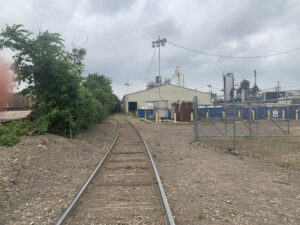 This dramatic news about GAF’s legal status and pollution levels comes precisely at the moment the company is applying for a renewal of its “Title V” operating permit from the State and EPA. Usually a mundane regulatory rubber-stamping, this process now has the potential to substantially add to the company’s headaches.
This dramatic news about GAF’s legal status and pollution levels comes precisely at the moment the company is applying for a renewal of its “Title V” operating permit from the State and EPA. Usually a mundane regulatory rubber-stamping, this process now has the potential to substantially add to the company’s headaches.
After months of requests by West Dallas 1 and elected officials, the Texas Commission on Environmental Quality (TCEQ) will be holding a virtual public hearing on the permit on July 29th at 7 pm.
Residents and others who want to ask questions or provide comments during the hearing may access the webcast by following this link:
https://www.gotomeeting.com/webinar/join-webinar
and entering 192-616-739 along with your email address or may call (512) 239-1201 at least one
day prior to the hearing for assistance in accessing the hearing and participating telephonically.
Members of the public who wish to only listen to the hearing may call, toll free, (415) 655-0060 and enter access code 569-744-316.TCEQ staff is recommending that you join and register at least 15 minutes before the hearing begins. A copy of the permit application can be viewed at the Dallas West Branch Library (2332 Singleton Boulevard). General complaints can be submitted in writing up to the hearing date to the TCEQ here:
https://www.tceq.texas.gov/assets/public/compliance/monops/complaints/complaints.html and objections to the permit renewal can be submitted here: http://www14.tceq.texas.gov/epic/eComment/.
Besides WD1, the groups lining-up to oppose the federal permit renewal are a combination of Dallas environmentalists, neighborhood associations, and social justice organizations, including Dallas Sierra Club, Downwinders at Risk, Public Citizen, and Southern Sector Rising.
After a review by TCEQ GAF’s permit renewal then heads to the Biden Administration’s EPA, which has pledged to work with communities of Color to reverse the kind of environmental racism the groups claim GAF is guilty of practicing.
“No permits. The wrong zoning. Dangerous levels of air pollution. Right in the middle of Black and Brown neighborhoods. Tell me how this ISN’T a repeat of the environmental racism West Dallas has been fighting for decades,” said Reyes. “We expect the Biden Administration to make good on its promise to end this kind of unacceptable discrimination.”
